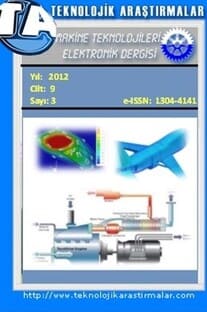Termal sistemlerde ekserji verimi
Gelisen teknoloji ile beraber enerji ihtiyacı gittikçe artmaktadır. Đnsanlık sadece sınırlı kaynak potansiyeli olan dünyada yeni enerji kaynak arayısları ile yetinmemis aynı zamanda artan enerji savurganlığının önüne geçmek için sistemlerin ekonomik kosullarda isletilmesini en önemli hedef olarak belirlemistir. Bu olgu yeni dizayn edilecek tüm sistemlerin ekserjetik verim açısından irdelenmesini zorunlu kılmıstır. Bu nedenle bir sistemin en ekonomik kosullarda isletilip isletilmediğinin ölçütü o sistemin ekserjetik veriminin belirlenmesinde yatmaktadır. Bu çalısmada, değisik termal sistemler için ekserjetik verim ifadeleri tanımlanarak, her bir model sistemin ekserjetik verim hesabında etkili olan parametreler tespit edilmistir.
Exergy efficiency in thermal systems
The request of energy is increasingly to increase together with developed technology. The scientists was only not satisfied with new energy sources, in addition to this they aimed the economic operation of systems as a great target to prevent energy extravagance. This fact necessitates the analysis in point of exergy efficiency of all new systems. Thus, the criteria of if any system is economically operated or not is determined by the calculation of exergy efficiency of system. In this study, the effective parameters was determined in exergy efficiency calculation of each model systems by defining exergetic efficiencies for different thermal systems.
___
- [1]. Çengel, A.Y. and Boles, M.A., 1994. An engineering approach thermodynamic. Mc. Graw Hill, 1985, USA
- [2]. Büyüktür, A.R. 1995. Termodinamik. Birsen yayınevi.
- [3]. Çomaklı K., 2003. Atatürk Ü. Isıtma sisteminin enerji ve ekserji analizi Atatürk Ü. Fen Bil. Enst.
- [4]. Onat, K., 1990. Kullanılabilir enerji kaybının azaltılması. Temodinamiğin ikinci kanunu Çalısma Toplantısı, Erciyes Üni. 29-1
- [5]. Eğrican, N. ve Özdoğan, S., 1990. Enerji sistemlerin ekserji analizine yönelik yeni bazı çalısmaların derlenmesi. Temodinamiğin Đkinci kanunu Çalısma Toplantısı, Erciyes Üni. 34-1
- [6]. Moran, M. J., and Sciubba, E., 1994. Exergy analysis: principles and practice. J. Eng. Gas Turbine and Power, 116, 285-290.
- [7]. Nakicenovic, N., Gilli, P. V., and Kurz, R., 1996. Regiomal and global exergy and energy efficiencies, Energy, 21, 3, 223-237.
- [8]. Tekin T., 1996. Erzurum seker fabrikasının ekserji analizi. Doktora Tezi, A.Ü. Fen Bilimler Ens. Makina Müh. Ana Bilim Dalı 75-97
- [9]. Ertay, H.S., 1997. Energy and exergy utilization in Turkish residential and commercial sector up to 2010.Y. Lisans tezi , ODTÜ Fen Bilimler Ens. Makina Müh. Ana Bilim Dalı 1-161
- [10]. Gürer, A.T., 1997. Energy and exergy utilization ın Turkish industrial sector up to 2010. Y. Lisans tezi , ODTÜ Fen Bilimler Ens. Makina Müh. Ana Bilim Dalı 1-154
- [11]. Ileri, A., and Gurer, T., 1998. Energy and exergy utilization in Turkey during 1995. Energy, 23, 12, 1099- 1106.
- [12]. Doldersum, A., 1998. Exergy analysis proves viability of process modification. Energy Convers. Magmt, 39, 19-18, 1781-1789.
- [13]. Sorin, M., Bonhivers, J. C., and Paris, J., 1998. Exergy efficient and conversion of chemical reactions. Energy. Convers. Magmt, 39, 16-18, 1863-1868.
- [14]. Sorin, M., Hammache, A., and Diallo, O., 2000. Exergy load distribution approach for multi-step process design. Applied Thermal Eng., 20, 1365-1380.
- [15]. Torres, E. A., and Gallo, L. R., 1998. Exergetic evaluation of a cogeneration system in a petrochemical complex. Energy. Convers. Magmt, 39, 16-18, 1845-1852
- [16]. Guaribell Jr. ,F., Cerqueria, A. A. G., and Nebra, S. A., 2000. Thermoeconomic evaluation of a gas turbine cogeneration system. Energy. Convers. Magmt, 41, 1191-1200.
- [17]. Dincer, I., 2000. Thermodynamics, exergy, and environmental impact. Energy Sources, 22, 723-732
- [18]. Estesvag, I. S., 2001. Society exergy analysis: a comparison of different societies. Energy, 26, 253-270.
- [19]. Verkhivker, G. P., and Kosoy, B. V., 2001. On the exergy analysis of power plants. Energy. Convers. Magmt, 42, 2053-2059
- [20]. Song, T. W., Sohn, J. L., Kim, J. H., Kim, T. S., and Ro, S. T., 2002. Exergy-based performance analysis of the heavy-duty gas turbine in part-load operation conditions. Exergy, 2, 105-112.
- [21]. Kotas, T.J., 1995, The exergy method of thermal plant analysis, Krieger Publishing Comp. 328, USA
- [22]. Rosen, M.A. and Dinçer, Đ., Exergy as the confluence of energy, environment and sustainable development, Energy Int. J. , 1(1), 2001, 3-13.
- [23]. Yamankaradeniz, R., 1997, Mühendislik Termodinamiğinin Temelleri, Uludağ Üniv. Güç. Vakfı yayın no: 22, Bursa, 337-371.
- [24]. Wall, G. And Gong, M., On exergy and sustainable development- Part 1: Conditions and concepts. Exergy Int. J., 1(3), 2001, 128-145.
- [25]. Wall, G. And Gong, M., On exergy and sustainable development- Part 2: Indicators and methods. Exergy Int. J., 1(4), 2001, 217-233.
- [26]. Szargut, J., Morris, D.R., Stewart, F.R., Exergy Analysis Of Thermal, Chemical And Metallurgical Processes, Hemisphere Publishing Corporation, New York, 1988.
- ISSN: 1304-4141
- Yayın Aralığı: Yılda 5 Sayı
- Başlangıç: 2004
- Yayıncı: -
Sayıdaki Diğer Makaleler
Polivinil klorür (PVC) malzemelerin sıcaklığa bağlı titreşim özelliklerinin incelenmesi
İsmail UCUN, Mehmet ÇOLAKOĞLU, Süleyman TAŞGETİREN
Bülent AKBAŞ, ŞEHMUS ALTUN, Cengiz CÖNER, İlker SUGÖZÜ
Genetik algoritmalar ve mekanik tasarım problemleri uygulamaları
Asenkron motor hata teşhisinde modern metotlar
Termal sistemlerde ekserji verimi
K. ÇOMAKLI, S. KARSLI, M. YILMAZ, Ö. ÇOMAKLI
Çift etkili silindirin servo valfle konum kontrolünün modellenmesi
